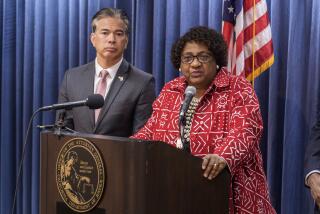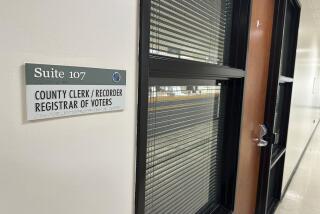7 Letter Bombs Discovered at 3 Locations
- Share via
WASHINGTON — Seven potentially deadly letter bombs were discovered Thursday in the Washington office of an Arabic language international newspaper, at a post office addressed to the paper, and at the federal penitentiary in Leavenworth, Kan. All were safely detonated or disarmed.
No one has claimed responsibility for the devices, which were contained in musical holiday cards. An FBI spokesman said the envelopes contained no return addresses but some of them were postmarked in Alexandria, Egypt.
Four of the packages were found in the offices of the Al Hayat newspaper in the National Press Building. Another package found in a post office was addressed to the paper, which is owned by Saudi Arabian Prince Khaled ibn Sultan ibn Abdulaziz, commander of Saudi troops during the 1991 Gulf War and son of the kingdom’s defense minister.
Two similar letter bombs were received by a parole officer at the federal penitentiary at Leavenworth, Kan.
The FBI said the incidents were being treated as related matters although there was no apparent connection between the parole officer and the newspaper.
Washington police said the first bomb was spotted Thursday morning by an employee of the newspaper who was opening the mail. With the envelope partly opened, the employee spotted a wire and called the police. A police spokesman said that if the man had gone much further in opening the letter, he could have been killed.
A police statement said investigating officers determined that the envelope “appeared to have all the components of a letter bomb.” Police then examined the rest of the newspaper’s mail and discovered a second device. Two more bombs were found in another batch of mail that arrived in the afternoon.
Police continued searching Thursday for other mail that might be on its way to the newspaper’s office.
An FBI statement described the letter bombs as “plain white envelopes, 5 1/2 by 6 1/2 inches in size with computer generated addresses.” The FBI said anyone receiving such an envelope should exercise extreme caution.
The press building, which is home to a number of out-of-town newspapers and also contains a shopping mall, was partially evacuated. A police spokesman said all the bombs were powerful enough to kill. The first two were detonated by police while the other two were disarmed and preserved as evidence.
Al Hayat is published in London but circulates worldwide. It serves Arabic readers much as the International Herald Tribune caters to English readers. It is edited in London but printed at a number of plants around the world.
Although the newspaper is owned by a senior member of the Saudi royal family, it follows an independent political line, occasionally criticizing the kingdom’s policy. The newspaper published the manifesto of a radical Islamic group after the fatal June 25 bombing of U.S. military barracks in the Saudi city of Khobar.
Jim Zogby, president of the Arab American Institute, said the newspaper is considered one of two mainstream international newspapers for Arabic readers.
Zogby said the paper’s editor, Jihad al Khazen, “is well known in the Arab world because he is so opinionated. He is a sharp critic of the U.S. role in the [Arab-Israeli] peace process but is also very antagonistic toward fundamentalist religious extremists.”
State Department spokesman Nicholas Burns said the administration was very concerned about the bombs. He said the investigation will be conducted by a joint terrorism task force operated by the Washington police and the FBI.
The bombs also could have been aimed at a member of the newspaper’s Washington bureau for reasons having nothing to do with the paper’s ownership or editorial policy. But if Khaled or the newspaper itself was the target, the list of potential suspects could range from anti-government Saudi dissidents, to Muslim militants, to backers of the regime trying to discipline the prince and his newspaper for breaks with the kingdom’s policy.
Khaled, frequently described as “arrogant” by friends and foes alike, wrote a book about his experiences as commander of Saudi forces during the Gulf War. He is a brother of Prince Bandar ibn Sultan, the Saudi ambassador to Washington.
Khaled has collected a number of enemies in recent years since he left the army after being passed over for promotion to chief of staff by his uncle, King Fahd.
More to Read
Sign up for Essential California
The most important California stories and recommendations in your inbox every morning.
You may occasionally receive promotional content from the Los Angeles Times.










